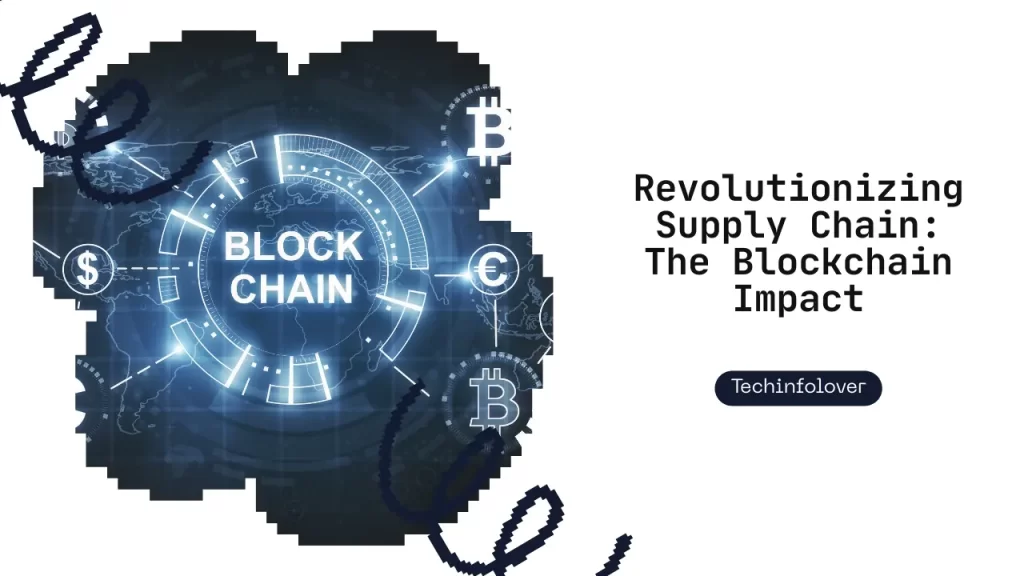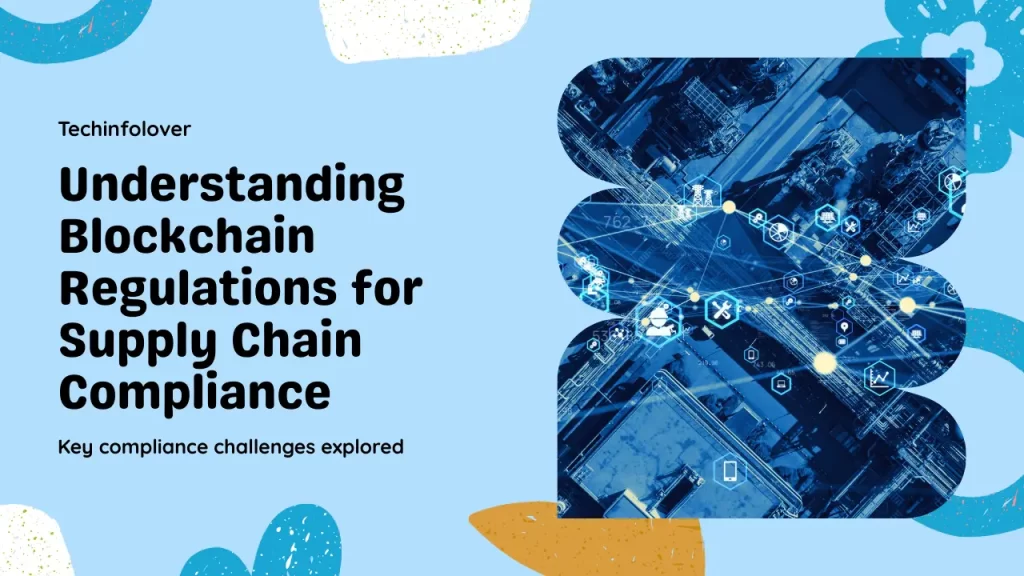Introduction
Supply chains are the backbone of global commerce. From raw materials to final delivery, every product you use passes through a complex network of suppliers, manufacturers, and distributors. But traditional supply chains face challenges—lack of transparency, delays, fraud, and inefficient tracking.
Enter blockchain.
Blockchain technology is transforming the way supply chains operate by adding trust, traceability, and automation to every step. In this article, you’ll discover how blockchain in supply chain management is not just a buzzword, but a game-changing innovation for businesses worldwide.

What Is Blockchain in Supply Chain Management?
Blockchain is a distributed digital ledger that records transactions in a secure, immutable, and transparent way. In the context of supply chain management, blockchain enables all parties—from farmers to manufacturers to retailers—to view and verify real-time data on goods as they move across the chain.
Instead of relying on centralized databases or paper-based systems, blockchain creates a decentralized record that can’t be altered without consensus. This provides:
- Enhanced visibility
- Improved trust
- Faster reconciliation
- Reduced fraud and theft
Key Features of Blockchain That Benefit Supply Chains
1. Transparency and Traceability
Every transaction recorded on the blockchain is time-stamped and visible to authorized users. This creates a full audit trail from origin to destination, enabling:
- Quick detection of faulty or counterfeit goods
- Easy compliance with regulations (e.g., FDA, ISO)
- Confidence in product provenance (e.g., organic, fair-trade)
2. Immutability and Security
Once data is written on a blockchain, it cannot be changed or deleted without permission from the network. This prevents:
- Tampering with shipment records
- Backdating or falsifying invoices
- Unauthorized access or breaches
3. Smart Contracts for Automation
Blockchain enables smart contracts—self-executing agreements coded into the blockchain. These contracts can automatically:
- Release payments when conditions are met
- Trigger re-orders based on inventory levels
- Alert stakeholders about delays or anomalies
4. Decentralized Collaboration
Blockchain allows multiple parties—suppliers, logistics companies, customs officials, etc.—to access and input data without relying on a central authority, reducing bottlenecks and improving coordination.
Benefits of Using Blockchain in Supply Chain Management
| Benefit | Description |
|---|---|
| End-to-End Visibility | Everyone in the supply chain sees the same, real-time data |
| Faster Reconciliation | No need for manual cross-checking of records |
| Lower Fraud Risk | Immutable records prevent data manipulation |
| Efficiency Through Automation | Smart contracts automate workflows and reduce delays |
| Better Inventory Management | Real-time tracking leads to fewer stockouts or overstock situations |
| Sustainability and Ethics | Verifies ethical sourcing and environmental compliance |
Real-World Use Cases of Blockchain in Supply Chain Management
1. IBM Food Trust – Food Safety and Transparency
IBM partnered with major retailers like Walmart and Nestlé to develop a blockchain-based system to trace the origin of food products. Using IBM Food Trust:
- The source of contaminated produce can be traced in seconds (vs. days)
- Retailers can ensure freshness and authenticity
- Consumers can scan a QR code and see a product’s journey from farm to shelf
2. De Beers – Conflict-Free Diamonds
De Beers, one of the world’s largest diamond companies, uses blockchain to track diamonds from mine to market. This ensures that only ethically sourced, non-conflict diamonds reach customers.
3. Maersk and TradeLens – Global Shipping
Maersk and IBM created TradeLens, a blockchain platform for global shipping. It reduces paperwork, customs delays, and administrative costs by enabling:
- Real-time cargo tracking
- Automated customs clearance
- Secure sharing of shipment documents
4. Provenance – Ethical Fashion and Retail
Provenance is a blockchain-based platform that helps brands prove the ethical sourcing of their products—be it organic cotton or cruelty-free cosmetics—creating consumer trust and brand value.
How Blockchain Solves Key Supply Chain Challenges
| Challenge | Blockchain Solution |
|---|---|
| Counterfeit goods | Immutable product IDs and origin tracking |
| Inventory errors | Real-time updates and synchronized records |
| Complex audits | Automatic and time-stamped documentation |
| Poor vendor coordination | Shared ledger for all supply chain partners |
| Data silos | Unified source of truth across organizations |
Integration of IoT and Blockchain in Supply Chains
Combining Internet of Things (IoT) devices with blockchain takes supply chain management to the next level.
Examples:
- Temperature sensors in cold-chain logistics (e.g., vaccines, seafood)
- GPS trackers for real-time shipment location
- Smart containers that report humidity, shock, or tampering
These IoT devices feed real-time data into the blockchain, which then records, verifies, and shares it with relevant parties. The result? Faster response times, fewer losses, and better customer service.
Blockchain vs Traditional Supply Chain Systems
| Feature | Traditional Systems | Blockchain Systems |
|---|---|---|
| Data Control | Centralized | Decentralized |
| Record Tampering | Possible | Nearly impossible |
| Manual Errors | Frequent | Automated and minimal |
| Trust Level | Low (requires third parties) | High (trustless system) |
| Update Frequency | Delayed (batch updates) | Real-time |
| Compliance Audits | Paper-heavy, time-consuming | Instant, automated trails |
Frequently Asked Questions
Q1: What is blockchain supply chain management?
Answer: Blockchain supply chain management refers to using decentralized, digital ledger technology to record, track, and share supply chain data securely and transparently among all parties.
Q2: How does blockchain improve supply chain transparency?
Answer: It records every transaction or movement of goods on a secure, shared ledger, making it easy for stakeholders to trace a product’s journey and verify its authenticity in real-time.
Q3: Can blockchain prevent counterfeit goods?
Answer: Yes. By assigning unique IDs to products and tracing their origin, blockchain helps detect and eliminate counterfeit items across the supply chain.
Q4: What industries benefit most from blockchain in supply chains?
Answer: Industries like food & agriculture, pharmaceuticals, luxury goods, manufacturing, shipping, and retail benefit greatly due to their complex, high-value, or regulation-heavy supply chains.
Challenges of Implementing Blockchain in Supply Chains
Despite its potential, blockchain adoption isn’t without roadblocks:
- Integration Costs: Setting up blockchain infrastructure can be expensive
- Lack of Standardization: No universal blockchain standard yet
- Scalability Issues: Blockchain networks can become slow as data grows
- Data Privacy: Shared ledgers raise concerns over sensitive business information
- Cultural Resistance: Partners may be reluctant to change existing systems
Solution: A hybrid model combining blockchain with cloud platforms, APIs, and existing ERP systems is often the most feasible starting point.
The Future of Blockchain in Supply Chain Management
The future is promising. As blockchain technology matures, we can expect:
- Interoperable blockchain systems across companies and borders
- AI-powered insights from blockchain data
- Green blockchain applications to track sustainability metrics
- Integration with digital twins and metaverse logistics platforms
According to Gartner, by 2030, blockchain will be a critical part of over 30% of all global supply chains, enhancing efficiency, trust, and competitiveness.
How Blockchain Enhances Supplier Accountability and Performance
One of the most persistent problems in supply chain management is ensuring supplier reliability and compliance. Traditional systems rely on static contracts and delayed reporting, making it difficult to monitor whether vendors are meeting their responsibilities.
With blockchain, every action taken by a supplier—whether it’s product dispatch, quality inspection, or compliance reporting—is logged in real time. This:
- Builds a historical performance record for each supplier
- Allows procurement managers to make data-driven decisions
- Reduces dependency on manual audits and spreadsheets
- Flags repeated non-compliance early, minimizing risk
Blockchain-based supplier scoring systems can also integrate third-party verification and social responsibility data (e.g., labor conditions, environmental compliance). This not only helps optimize vendor selection but also ensures that brands uphold ESG (Environmental, Social, and Governance) standards.
Blockchain and Ethical Sourcing: Building Consumer Trust through Verified Origins
Consumers today are more conscious than ever about where their products come from. They want to ensure the coffee they drink is fair-trade, the diamonds they wear are conflict-free, and the clothes they buy aren’t made in sweatshops.
Blockchain allows companies to digitally certify ethical sourcing claims by recording verifiable data at every stage of the supply chain. Here’s how it helps:
- Farmers and producers enter origin data at the source
- Certification bodies validate claims (e.g., organic, fair trade)
- Every party in the chain verifies and passes the record along
- Consumers can scan a QR code to view the entire journey
By offering verified transparency, blockchain helps brands like Patagonia, Starbucks, and Everledger stand out in the market, earn consumer trust, and comply with global regulations like the Modern Slavery Act or EU Supply Chain Due Diligence Laws.
Role of Consortium Blockchains in Inter-Company Collaboration
While public blockchains like Ethereum are well-known, most supply chains operate best on consortium (permissioned) blockchains—networks where access is granted only to trusted parties.
These networks allow multiple companies—suppliers, logistics providers, customs agencies, and retailers—to collaborate securely without exposing their confidential data to outsiders.
Benefits of consortium blockchains in supply chain include:
- Controlled access levels for each participant
- Better scalability and transaction speed
- Legal and contractual enforceability
- Reduced risk of corporate espionage or data leaks
Examples include Hyperledger Fabric, Corda by R3, and Quorum. These platforms offer enterprise-grade solutions with integration APIs, regulatory compliance features, and multi-cloud deployment support—making them ideal for large, multi-party supply chains.

Blockchain Regulations and Compliance in Supply Chain Applications
As blockchain adoption grows in supply chain use cases, governments and international bodies are moving to regulate its use to ensure security, privacy, and fair competition.
Key regulatory considerations include:
- Data Privacy Laws (e.g., GDPR, CCPA): Blockchain’s immutability must be balanced with individuals’ right to be forgotten.
- Cross-Border Trade Laws: Customs and taxation rules must be considered when tracking goods internationally.
- Smart Contract Legality: Many countries are still developing legal frameworks for blockchain-based contracts.
- Anti-Money Laundering (AML) and Know Your Customer (KYC): These are especially important when supply chains involve financial transactions.
Complying with these regulations requires careful architecture planning, including private data channels, anonymized identifiers, and local jurisdiction nodes. Companies using blockchain for supply chain purposes must also stay updated on national and international legislation to avoid legal complications.
Conclusion
Blockchain in supply chain management is not a passing trend—it’s a powerful transformation tool for modern logistics. By improving transparency, security, and automation, blockchain enables businesses to:
- Build trust with consumers
- Eliminate inefficiencies
- Protect against fraud and losses
While adoption takes time and effort, the long-term benefits are undeniable. Forward-looking companies are already reaping the rewards of blockchain-powered supply chains—and the gap will only grow.
Final Thought: The question is no longer if blockchain will revolutionize supply chains, but when you’ll choose to be part of that revolution.



